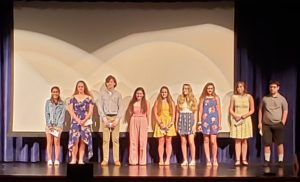Students involved in Veterans Oral History Project—a partnership between Southern High School in Anne Arundel County and Maryland Humanities—conduct oral history interviews with war veterans. Prior to the interviews, they receive training from Dr. Barry Lanman of the Martha Ross Center at the University of Maryland, Baltimore County. Transcripts and video of the interviews are housed at the Maryland State Archives and can be accessed online here. Last year, the program was recognized as the Four Rivers Heritage Area 2018 Heritage Partnership of the Year. Kyle E. Chaney has participated twice in the Veterans Oral History Project and has helped students new to the program with their projects. He shares his experience here.

The Veterans Oral History Project teaches young, growing students like myself multiple life lessons and values: it gives me a chance to talk to the heroes not heard of often in our everyday lives. We hear documented true stories that come directly from the veterans themselves, describing their experience in the battles fought to protect the interests of our country and its allies.
Before speaking to veterans, students are given several visits by the one and only Dr. Barry Lanman, Director of the Martha Ross Center for Oral History and professor at University Maryland, Baltimore County. Dr. Lanman describes to us his process of documenting oral histories and the reasons why it is so necessary to record the memoirs of a soldier. We need to learn from the past actions of our ancestors, and should record their memories to help prove the dire need to prevent another war. The need to show thanks and respect is a debt owed to the men and women who protected us.
After students are introduced to the process, we are then divided up into groups. These groups function as a team to record a preliminary interview with our veteran. The groups then research and create their own interview questions, interview the veteran themselves, and learn to piece together critical messages from the veteran to create a memorable story of the soldier. This is to ensure these stories aren’t lost in time but preserved for all to learn. I have participated twice in the program so far, and helped the new students on their projects, but I’m still learning new things and skills each time! I learned how to function with a group of people as a team, how to express my opinions with my peers respectfully, how to manage my work in a timely manner, and how to treat others with respect. There is so much to learn from those who have accomplished so much. Each project is unique because each and every veteran has their own story to tell. The perspective of each person is different, and so is the way that people compartmentalize and react to a situation.
Both times I participated in the Veterans Oral History Project, I had plenty of bumps and obstacles that I needed to overcome in order to be successful. For example, most veterans are older and may have issues with speech or hearing; at times my group would end up leaving me to work alone or with a partial group, which taught me how to make executive decisions when needed to. The next year, I had the privilege of creating my own interview team and interviewing Maryland Humanities’ first World War II veteran to participate in the program.
Several more veterans now wish to be recognized and remembered by this organization; it enlightens and excites me to know that our work is changing the community around us! If you too have a veteran that wishes to be remembered, then maybe this is the time to put them in the spotlight to preserve their story. Thanks to Maryland Humanities, and people like Dr. Lanman, all of this is possible. I hope to learn more from these veterans as I continue to provide service to the organization.
Disclaimer: The views and opinions expressed on our blog do not necessarily reflect the views or position of Maryland Humanities or our funders.

